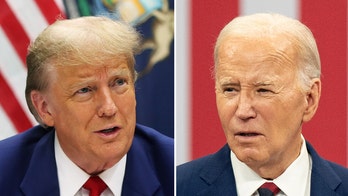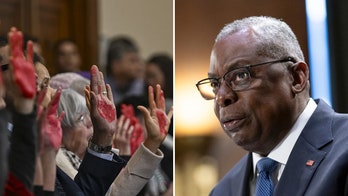The most pivotal moment yet in the immigration reform debate comes this afternoon during a 5:30 p.m. ET procedural vote in the Senate.
It's a cloture vote, designed to curb debate. But the vote will be viewed as a key test as to whether the Senate can approve the immigration bill ... perhaps in the next week.
The Senate has debated various aspects of the bill for a couple weeks now. But like all pieces of legislation, the challenge is finding the "sweet" spot. That seems to have happened in the past few days, thanks in part to a border security amendment crafted by Sens. Bob Corker, R-Tenn., and John Hoeven, R-N.D. -- with some behind-the-scenes engineering from Sen. Chuck Schumer, D-N.Y. Known colloquially as the "border surge," the 119-page amendment would amp up security on the U.S. border with Mexico and double Border Patrol forces.
This amendment is key to potential passage of the Gang of 8 immigration plan because it seems to unlock a significant tranche of Republican votes. Republicans have long been skeptical about immigration reform -- unless someone propounds a feasible solution for first securing the border. In the eyes of many Republican senators, the Corker-Hoeven amendment does just that.
So Senate Majority Leader Harry Reid, D-Nev., teed up the most significant vote on immigration reform in the Senate in years for today. Reid latched the Corker/Hoeven plan to a refined amendment offered by Sen. Patrick Leahy, D-Vt.
This is the "test." If the plan marshals more than 60 votes, the immigration bill could very well find itself on a pathway to passage.
"Invoking cloture" in the Senate is a method for curbing debate. Unlimited debate is the Senate's norm. So in order to halt a filibuster, the Senate must invoke cloture and terminate the debate later in the week. But it needs a supermajority of 60 votes to do so.
Here's why 60 votes are so important on immigration reform:
For starters, the Senate needs just a simple majority to OK most measures. But the trick is ending debate. That's where 60 votes comes in to play. So if the Senate can score anything north of 60 votes on today's cloture vote, the immigration reform bill is in business. It will have secured wide, bipartisan support -- well above the simple majority threshold of 51 votes. That simultaneously plows the procedural road, preventing any senator from stopping it.
But this "test" vote features another dynamic. Watch how many votes it can garner above 60.
"I think we're on the verge of getting 70 votes," said Gang of 8 member Sen. Lindsey Graham, R-S.C., on "Fox News Sunday." "We're very, very close to getting 70 votes."
The higher the vote total, the better, for supporters of the bill -- because it could nudge the House to act. (And the vote does not immediately halt debate. It just limits debate to an additional 30 hours.)
In many respects, this is not just a test for the Senate, but the House of Representatives, too. That's why supporters of the Gang of 8 plan and the Corker/Hoeven amendment are angling for well above 60. 70 yeas or even more represents a powerful, bipartisan nod from the Senate on a controversial and complex issue -- even in the face of ardent opposition. Conservatives and Tea Party loyalists are dialing up efforts to suppress that vote total as they oppose the Gang of 8 bill. They argue the border security provisions aren't as strict as its backers portray them to be. They don't like the fact that 11 million illegal immigrants now in the U.S. have a shot at citizenship down the road, characterizing the process as "amnesty." So the test is two-fold. It's one thing to end debate with 60 votes. It's altogether something different to get two-thirds or more of the Senate to vote yes.
That's where the House of Representatives comes in.
One only need to look at last week's surprising, cataclysmic meltdown of the farm bill in the House to comprehend how challenging passing an immigration bill could be. The House Republican leadership appeared paralyzed last week in the bid to conjure up the votes to pass the measure. Most significantly, it demonstrated how enfeebled its leadership can be in trying to pass important legislation.
House Speaker John Boehner, R-Ohio, and other GOP leaders know right now they can't pass an immigration reform bill without Democratic support. That's the coalition which ruptured last week on the farm bill.
There's a longstanding Capitol Hill dictum that says that one body of Congress is more willing to support a measure if there's substantial backing for it in the other. Hence the frantic push to run up the scoreboard on today's cloture vote.
But in recent years, that axiom hasn't held up too well.
Consider the payroll tax bill in the Senate in December, 2011. Senate Minority Leader Mitch McConnell, R-Ky. engineered an extension of the tax cut which the Senate cleared 89-10. That plan was practically thought to be a fait accompli in the House before a fateful conference call with rank-and-file Republicans. They excoriated the package and lit into their leaders. Boehner was then forced to approve the plan unilaterally a week later, just before Christmas.
In addition, big, bipartisan majorities in the Senate meant nothing on the farm bill. Last year, the Senate okayed the farm package 64-35. That plan never even saw a debate in the House because Republicans didn't have the votes to approve it.
So does a large, bipartisan Senate vote on today's cloture motion telegraph anything about the House?
That's the question.
In addition, the Corker/Hoeven amendment is 119 pages long. It's glommed on to the rest of the Gang of 8 bill. That makes the entire bill around 1,200 pages.
There is some grousing that the sides have not had time to read 1,200 pages since Friday. That's a bit of spin. The base, Gang of 8 bill has been ready since late May. The 119 pages were added Friday afternoon.
Senate meets this afternoon for debate. There is a potential for press conferences later as well.
We should have a result on this key vote by 6 p.m. or 6:15 p.m. ET at the latest.




